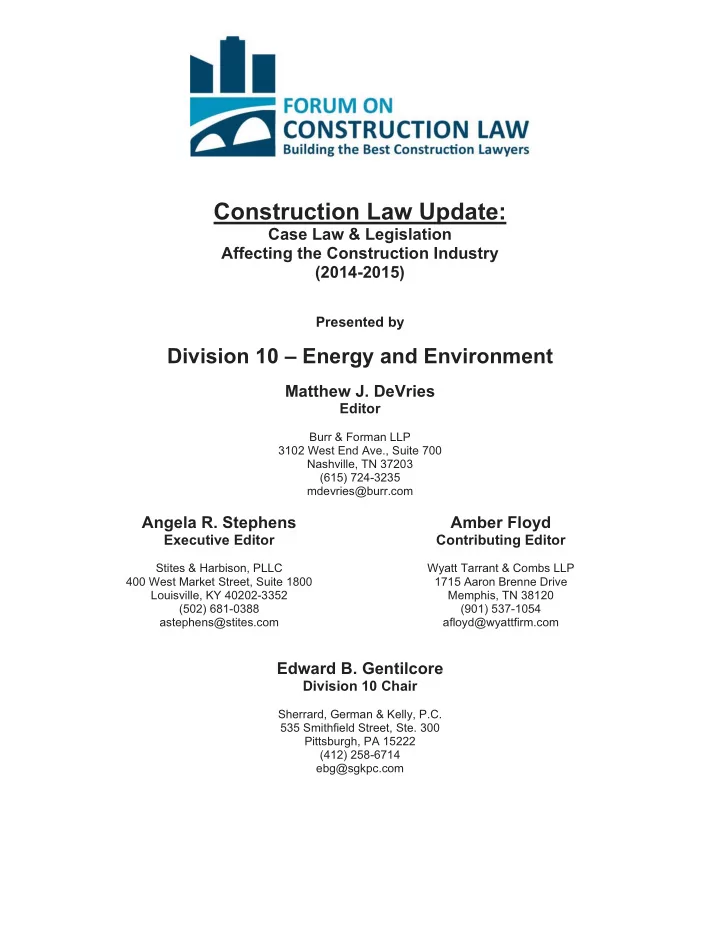

Construction Law Update: Case Law & Legislation Affecting the Construction Industry (2014-2015) Presented by Division 10 – Energy and Environment Matthew J. DeVries Editor Burr & Forman LLP 3102 West End Ave., Suite 700 Nashville, TN 37203 (615) 724-3235 mdevries@burr.com Angela R. Stephens Amber Floyd Executive Editor Contributing Editor Stites & Harbison, PLLC Wyatt Tarrant & Combs LLP 400 West Market Street, Suite 1800 1715 Aaron Brenne Drive Louisville, KY 40202-3352 Memphis, TN 38120 (502) 681-0388 (901) 537-1054 astephens@stites.com afloyd@wyattfirm.com Edward B. Gentilcore Division 10 Chair Sherrard, German & Kelly, P.C. 535 Smithfield Street, Ste. 300 Pittsburgh, PA 15222 (412) 258-6714 ebg@sgkpc.com
New Jersey Case law: 1. In Dispenziere v. Kushner Companies, N.J. Super. LEXIS 157 (N.J. App. Div. November 21, 2014) (“Dispenziere”), the New Jersey Appellate Division found an arbitration clause in a condominium Public Offering Statement unenforceable because it lacked “clear and unambiguous language” that the party was waiving her right to sue. In reaching its decision, the Dispenziere court followed the precedent established by the New Jersey Supreme Court in a decision that came down earlier that year in the matter of Atalese v. United States Legal Services Group, L.P., 219 N.J. 430 (2014) (“Atalese”). Plaintiffs in Dispenziere were individual purchasers in a condominium development that brought suit against the defendant developer who they claimed represented that their units would be part of “a large waterfront community, which was to include diverse amenities, including a Community Center, a Health Club, a waterfront esplanade, [three] parks, and other recreational improvements.” After closing on their units, plaintiffs alleged that the defendant changed the nature of the development and failed to offer the amenities previously represented to be part of the development. After plaintiff filed suit in New Jersey Superior Court, defendant moved to compel arbitration based on an arbitration clause contained in the Public Offering Statement that was provided to plaintiffs with their purchase agreements, which required any disputes with the developer be brought to arbitration before the American Arbitration Association. The Law Division granted the motion to compel arbitration and plaintiffs appealed. In reaching its decision, the Appellate Division in Dispenziere relied heavily on the Supreme Court’s reasoning in Atalese . Although Atalese involved claims under New Jersey’s Truth in Consumer Contract, Warranty and Notice Act and the Consumer Fraud Act, while Dispenziere implicated New Jersey’s Consumer Fraud Act and common law claims, the Appellate Division found the distinction unimportant. The fact that some of the plaintiffs were represented by counsel was also insignificant. Rather, the court looked to whether the arbitration clause clearly stated its purpose and informed that by electing arbitration the parties understood that they were “waiving their time-honored right to sue.” Applying this reasoning the Dispenziere court struck down the arbitration clause because it was devoid of any language that would inform purchasers such as plaintiffs that they were waiving their right to maintain an action in court. Following Atalese , the court found this lack of notice “fatal to defendants' efforts to compel plaintiffs to arbitrate their claims.” 2. In the case of The Palisades at Fort Lee Condominium Assoc. v. 100 Old Palisade, 2014 N.J. Super. LEXIS 743 (N.J. App. Div. March 31, 2014) (“ Palisades ”), the New Jersey Appellate Division examined when a cause of action accrues for statute of limitations purposes on claims brought by a condominium association for a development that was originally constructed as a rental complex. “Generally, in construction cases a cause of action accrues for statute of limitations purposes at the time of substantial completion of a party's work.” The exception to that general rule is found in cases where the equitable principle of the discovery rule is applicable. The court found that the facts present in Palisades did not warrant straying from the general rule. The development in Palisades began as a rental apartment building owned and operated by the original developer, Palisades A/V Acquisitions Co., LLC (“A/V”). The development was substantially complete on May 1, 2002. Approximately two years later, A/V
sold the development to the sponsor, Crescent Heights. Crescent Heights controlled the Condominium Association until July 2006 when the unit owners assumed control of the Association. The Association engaged an independent engineer to perform an inspection, which revealed various construction and design defects forming the basis of plaintiffs’ first Complaint filed on March 12, 2009, approximately seven years after the date of substantial completion. In examining when the cause of action should be found to have accrued - upon substantial completion or when the defects were discovered - the court found dispositive the fact that the defendant contractors were retained to build a rental apartment building and could not have reasonably anticipated having claims filed against them by subsequent buyers. “The statute of repose was drafted to "delimit [the] greatly increased exposure" of potential builder or contractor liability and has been broadly interpreted since its inception in 1967.” The numerous changes of ownership at the development from owner, apartment developer, then sponsor, to the Association led the court to apply the six year statute of limitations and find plaintiffs’ claims untimely brought. Submitted by: Lisa Lombardo, Gibbons P.C., One Gateway Center Newark, NJ 07102, (973) 596- 4481,llombardo@gibbonslaw.com.
Recommend
More recommend